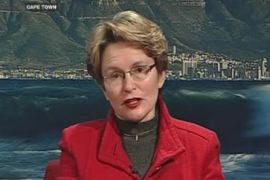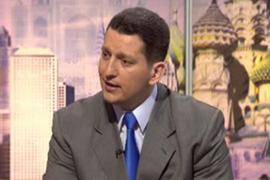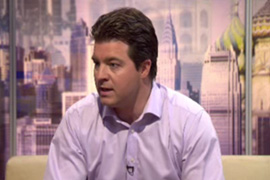
Violence in South Africa
Plus rising oil prices, James Ivory and Gore Vidal on the US elections.
 |
| Bishop Paul Verryn talks to Sir David from Johannesburg, South Africa |
Bishop Paul Verryn and Helen Zille
On May 11, a wave of brutal attacks against foreigners began in townships around Johannesburg. At least 42 people have been killed and thousands have been displaced. The violence also spread to Cape Town. For the first time since the end of Apartheid the army have been deployed.Bishop Verryn calls on the country’s political leaders to make clear that such violence is unacceptable while Zille says that the South African government’s policy towards countries like Zimbabwe is partly to blame for the trouble.
 |
| Gore Vidal discusses the US presidential elections |
This week Barack Obama won the Democratic primary in Oregon. The result edges the Illinois senator yet closer to securing the Democratic party’s nomination to run in November’s US presidential election.
Hillary Clinton, however, has promised to fight on despite having little chance of winning. Clinton claims to be stronger in the battleground states crucial in the general election. But many believe this is damaging the Democrats and Obama’s eventual presidential campaign.
Vidal says that despite his lack of experience Barack Obama is an attractive, intelligent candidate, and it would be a sign of progress if the US elected its first black president.
 |
| Jihad Makdissi reveals that he is cautiously optimistic about Israeli-Syrian peace talks |
This week Israel and Syria held peace talks, the first since 2000. The last round of negotiations broke down after the two sides failed to agree on the extent of Israel’s withdrawal from the Golan Heights.
The territory is of strategic importance with its vantage over northern Israel and southern Syria, and any agreement between the two countries will almost certainly have to resolve its status.
Makdissi says he is cautiously optimistic about the negotiations, adding that they may pave the way for direct negotiations between the two country’s.
 |
| James Ivory discusses his life’s work |
From A Room with a View to Howards End and The Remains of the Day, Merchant Ivory has become synonymous with beautifully crafted feature films and period dramas.
He joins Sir David to discuss his life’s work.
 |
| Economist Liam Halligan explains why oil prices are soaring |
On Thursday morning the price of oil reached a new record high – $135 a barrel.
Three years ago the investment bank, Goldman Sachs, suggested to some ridicule that oil could pass $100. Now Goldman Sachs is predicting a super-spike that will drive crude oil up to $200 a barrel.
He says that unrelenting demand from India and China and the increasing demand for material goods in these countries is one of the many factors driving up crude oil prices. On the supply side, he says, the world cannot produce oil fast enough to meet demand.
 |
| Matthias Schmale of the Red Cross discusses the humanitarian crisis in Myanmar |
On May 2, Cyclone Nargis crashed into Myanmar. Around 78,000 people are thought to have died and a similar number may still be missing. The country now faces an unprecedented humanitarian crisis. Thousands have lost their homes and possessions, and are now threatened with disease and starvation.
Schmale expresses his hope that that the Burmese government will follow their words with action. But he warns that with each passing day the risk to human health increases.
Watch the interviews with Liam Halligan and Matthias Schmale